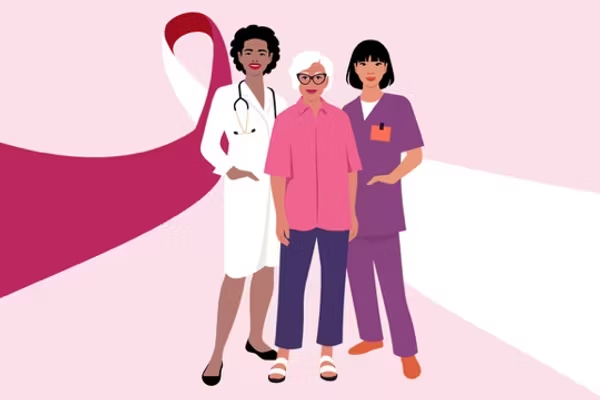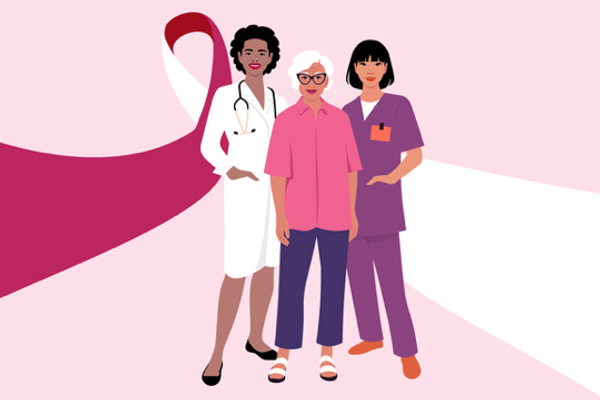If you’re caring for someone with head and neck cancer, you may be at a higher risk of caregiver burnout than some other groups of cancer caregivers.
A 2023 study in JAMA Network Open found that caregivers for people suffering from head and neck cancer are at higher risk of their own negative health impacts than caregivers for people with other types of disease. This is likely because of the intense nature of head and neck cancer.
Seth Eisenberg, president at PAIRS Foundation, who had head and neck cancer himself seven years ago, pointed out that the stress of watching someone go through the challenges of this type of cancer — which often affects eating, breathing and speaking — can be particularly distressing for a caregiver.
The intense burden of the disease can also keep patients from being able to work, and the JAMA study found that patient unemployment increased the odds of caregiver burnout sixfold. That’s likely because the inability to work usually means more caregiving time is necessary and/or the symptoms of the cancer are more severe, both of which can mean a higher caregiving burden.
Disrupted schedules, financial challenges, lack of family support, their own health problems and lowered self-esteem can all contribute to caregiver burnout. And caregiver burnout can lead to serious health impacts for the caregiver, such as anxiety, depression, heart complications, sleep deprivation and fatigue.
Here are 4 tips for self-care when you’re caregiving for someone with head and neck cancer.
1. Ask a medical team for training as soon as possible
Caregiver burnout tends to develop within the first six months of diagnosis and can increase very rapidly. One of the best strategies for dealing with caregiver burnout may be taking steps to prevent it in the first place. If possible, ask a medical team as soon as possible after diagnosis for hands-on training that can help with the caregiving tasks of head and neck cancer.
A 2023 survey in Cancer Nursing of family caregivers of head and neck cancer patients found that getting help with the practical aspects of caregiving with this type of cancer is enormously important. Family members or loved ones are asked to take on tremendously technical nursing tasks such as tracheostomy care, tube feedings and pain management, on top of managing the emotional and mental needs of the patient as well.
Caregiving through head and neck cancer comes with a lot of challenges, but ensuring that you understand the practical basics of the medical care you need to provide can help relieve some of the psychological distress and emotional burden that can make caregiver burnout worse.
2. Talk to an employer about caregiving accommodations
One thing that all research on the caregiving impacts of head and neck cancer points to is the strain on caregivers’ employment. Trying to balance the needs of caregiving with your own employment can be a recipe for fast burnout.
If possible, caregivers should talk to their employers to request any reasonable accommodations or even caregiving leave, especially in the early days of caregiving when the learning curve may be especially steep. Eisenberg also points out that there are specific cancer caregiving grants and financial assistance programs caregivers can apply for that can help relieve some of the financial burden.
3. Set up self-care
It might seem like just another burden on a to-do list, but being intentional about self-care can help soften the impacts of caregiver burnout. While self-care might seem selfish or even a waste of time when you have so much to do, even a small amount of self-care can significantly decrease the risk of health impacts from caregiving.
Self-care doesn’t have to be a huge effort, either. Some examples of self-care include:
- Daily movement, like exercise or a walk
- Therapy
- Counseling
- Proper nutrition
- Talking with friends or loved ones
- Time off to enjoy hobbies
- Journaling
- Meditating
- Scheduling medical check-ups and wellness visits
4. Find support
Again, finding support can feel like yet another task on a caregiver’s to-do list, but it can also make a vital difference in both your mental and physical health. Some resources for finding support include:
- Asking a social worker for resources
- Attending virtual or in-person therapy
- Finding an in-person caregiving support group
- Leaning on friends and family
- Looking for online support groups for cancer caregivers
- Applying for cancer caregiving financial aid or assistance programs
- Signing up for a local meal delivery program, either community-based or a paid service
- Using transportation assistance if needed
“Don’t hesitate to ask for help from family members, friends or professional caregivers,” Eisenberg said. “Delegating tasks can reduce the burden and provide caregivers with much-needed respite.”
This educational resource was created with support from Daiichi Sankyo and Merck.
- Coping With the Emotional Impact of Head and Neck Cancer ›
- What Is the Link Between HPV & Head and Neck Cancers? ›
- Understanding Head and Neck Cancer ›
- Symptoms of Head and Neck Cancer ›
- Fast Facts: What You Need to Know About Head and Neck Cancer ›
- 9 Signs You Might Have Head and Neck Cancer - HealthyWomen ›
- Síntomas de cáncer de cabeza y cuello - HealthyWomen ›






